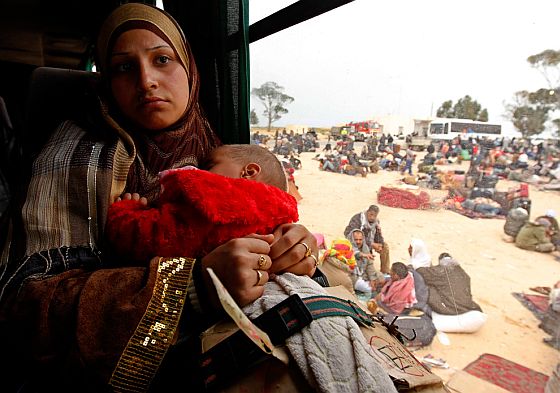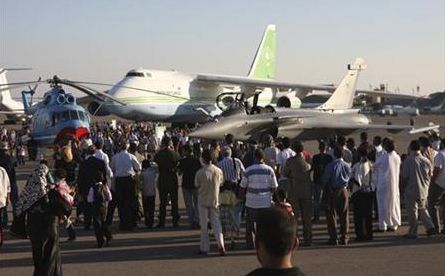Gaddafi appeals to Obama to intervene in Libya
Our dear son, Excellency, Baraka Hussein Abu oumama, your intervention is the name of the U.S.A. is a must, so that Nato would withdraw finally from the Libyan affair. Libya should be left to Libyans within the African union frame. (Mu’aumer Qaddaffi, Leader of the Revolution, Tripoli 5.4.2011)
Iran backs Libyan rebels, chastises West over oil, Bahrain
Libya’s rebellion has put Iran in an awkward position. Tehran has tried to balance support for the Libyan opposition, which it views as part of a region-wide “Islamic awakening,” with rejection of the NATO-led military strikes.
Iranian officials charged that the U.N.-endorsed military intervention on humanitarian grounds is hypocritical and part of a secret Western agenda. Tehran opposes any military intervention in the Middle East, even if in Iran’s interest, because of the precedent it sets. Iran also opposed the 2003 U.S. invasion of Iraq, despite the fact Saddam Hussein was Iran’s main adversary in the region.
In his Nowruz (New Year) speech last month, Supreme Leader Ayatollah Ali Khamenei charged that the United States and its allies were motivated by interest in Libyan oil. Iran’s foreign ministry spokesperson said that coalition was pursuing a new form of colonialism. (Tehran Bureau)
Sanctions are dropped against Libyan defector
The Obama administration dropped financial sanctions on Monday against the top Libyan official who fled to Britain last week, saying it hoped the move would encourage other senior aides to abandon Col. Muammar el-Qaddafi, the country’s embattled leader.
But the decision to unfreeze bank accounts and permit business dealings with the official, Moussa Koussa, underscored the predicament his defection poses for American and British authorities, who said on Tuesday that Scottish police and prosecutors planned to interview Mr. Koussa about the 1988 Lockerbie bombing and other issues “in the next few days.”
Mr. Koussa’s close knowledge of the ruling circle, which he is believed to be sharing inside a British safe house, could be invaluable in trying to strip Colonel Qaddafi of support.
But as the longtime Libyan intelligence chief and foreign minister, Mr. Koussa is widely believed to be implicated in acts of terrorism and murder over the last three decades, including the assassination of dissidents, the training of international terrorists and the bombing of Pan Am 103 over Lockerbie, Scotland. (New York Times)
Libya rebels ‘pressured into Lockerbie apology’
Libya’s rebel administration has said that it signed an apology for the Gaddafi regime’s role in IRA attacks and the Lockerbie bombing under pressure from the British government, and that the document is the result of “misunderstanding”.
After initially denying that the document existed, the revolutionaries’ governing council acknowledged that its chairman, Mustafa Abdul Jalil, had indeed signed an apology on behalf of the Libyan people for Gaddafi’s provision of semtex used in IRA bombings and for the blowing up of the Pan Am flight in 1988. It also promised compensation.
Amid division and confusion over the declaration, which some blamed on a translation mix-up, council officials said that the issue of the Libyan government’s responsibility for attacks in the UK came up only because it was pressed on the revolutionary administration by the British. (The Guardian)
Libya’s rebel forces need more than just weapons
Robert Haddick, the managing editor of Small Wars Journal and a columnist for Foreign Policy magazine, said the rebels’ most significant need is basic instruction in both offensive and defensive tactics at the small-unit level — and in identifying and training commanders.
“You could train hundreds of men in those skills, maybe even thousands, in two months, probably,” Mr. Haddick said.
“But I think the more difficult task, and something that would take far more time, would be to select leaders — squad leaders, platoon leaders and company commanders,” he said.
There is no good estimate on how many Libyans have taken up arms on the side of the rebellion. Many are not even full-time, but show up for a fight and then return home. They are of questionable physical conditioning. They have little training in weapons and none in military discipline.
Among the rebels, according to American intelligence estimates, are about 1,000 men who have trained with the Libyan army, as both officers and foot soldiers, before changing sides. The government’s force is estimated at roughly 30,000. (New York Times)


